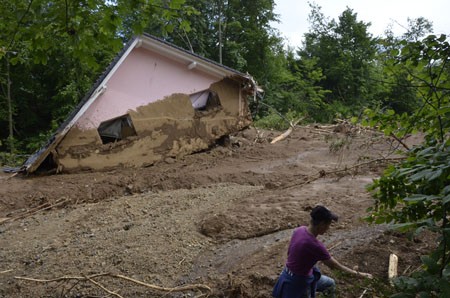Nutritional Supplement Minimizes Stress After a Natural Disaster
Certain nutritional supplements may help people cope following natural disasters. Following a 7.1 magnitude earthquake in Christchurch, New Zealand, in 2010, researchers there who were working on a clinical trial of a broad spectrum mineral and vitamin formula for ADHD realized that they could compare participants who had been taking the nutritional supplements at the time of the earthquake with those who had either already completed the trial or had not yet begun it. Two weeks after the quake, those who had been taking the multivitamin at the time of the quake were less anxious and stressed than those who hadn’t been taking the formula.
When another large earthquake struck five months later, the researchers implemented a randomized trial comparing two doses of the same broad spectrum supplement with a B Complex vitamin formula that had previously shown efficacy for stress and anxiety. Those participants taking any supplement showed fewer symptoms of post-traumatic stress disorder (PTSD) a month after the second quake compared to controls, and those taking the higher dose of the broad spectrum formula had greater improvements in mood and anxiety than those taking the B Complex supplement.
More recently, in Alberta, Canada, flooding forced many people from their homes. Researchers there who were studying the effects of micronutrients on stress and anxiety realized they had the opportunity to replicate the research from New Zealand in a different type of environmental disaster.
Researcher Bonnie J. Kaplan and colleagues recruited adults who had been affected by the flood, and randomized the participants to receive different types of supplements: vitamin D (1 pill/day); a B complex vitamin containing B6, B12, and several other nutrients (1 pill/day); or a broad spectrum supplement containing 24 vitamins and minerals and several botanical extracts (4 pills/day). No placebo was used—it was considered unethical to deny participants access to a potentially helpful treatment.
In a 2015 article in the journal Psychiatry Research, the Alberta team reported that while all of the nutrient supplements minimized stress after the flood, patients randomized to the B complex vitamin or the broad spectrum formula had less stress and anxiety following the flood than those randomized to vitamin D.
We have previously described a broad spectrum vitamin preparation called EMPowerplus, used by psychiatrist Charles Popper and psychologist Mary A. Fristad to treat children with treatment-resistant bipolar disorder. This may be the same formula used in the Alberta study. We await larger trials of this preparation in children with bipolar disorder.
Multivitamin and Mineral Preparations for Childhood Bipolar Disorder
 Researcher Charles Popper gave a talk at the 2014 meeting of the American Academy of Child and Adolescent Psychiatry on the benefits of nutritional supplements designed to provide multiple vitamins and minerals to children with bipolar disorder and other dyscontrol syndromes, such as attention deficit hyperactivity disorder (ADHD) and oppositional defiant disorder. Popper reviewed the literature on the substantial incidence of vitamin and mineral deficiencies among these children.
Researcher Charles Popper gave a talk at the 2014 meeting of the American Academy of Child and Adolescent Psychiatry on the benefits of nutritional supplements designed to provide multiple vitamins and minerals to children with bipolar disorder and other dyscontrol syndromes, such as attention deficit hyperactivity disorder (ADHD) and oppositional defiant disorder. Popper reviewed the literature on the substantial incidence of vitamin and mineral deficiencies among these children.
A modicum of data support the effectiveness of supplements for children with these disorders. One of these supplements is called EMPowerPlus and is sold online. It is moderately expensive and must be given under the supervision of a knowledgeable treating physician. While it is relatively safe in medication-free children, Popper says it can exacerbate withdrawal reactions from some psychotropic medications.
In addition, EMPowerPlus greatly increases lithium-related side effects, in patients taking lithium, the dose must be reduced to about one-tenth of a normal dose for those who are adding EMPowerPlus.
Popper and another researcher, Mary Fristad, have both seen excellent responses to this type of supplementation in children with bipolar disorder who have been unresponsive to more traditional drugs.
In another study by Rita Aouad et al., 72.3% of 980 children with a variety of psychiatric diagnoses had insufficient vitamin D levels (values < 30 nanograms/ml) and 26.7% had vitamin D deficiency (values < 20 nanograms/ml). These data support the rationale for vitamin D supplementation, especially in those who have low levels to start with.


